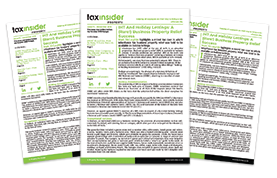Before you go, sign up to our free tax saving email course. Get 7 top property tax saving strategies in your email inbox that will help you save thousands in tax. Unsubscribe any time.
|
Many parents wish to support family members by gifting them assets, with the aim of providing a source of income and/or something that will appreciate in value over time. For example, a parent (e.g. mother) may gift a 50% interest in an investment property in London to her adult son. The possible tax implications will need to be considered, including capital gains tax and possibly stamp duty land tax. However, this article focuses on the inheritance tax (IHT) position. Making a reservation The ‘gift with reservation’ (GWR) anti-avoidance rules need to be considered. The GWR rules are designed to prevent ‘cake and eat it’ situations whereby an individual makes a lifetime gift of an asset (which they hope to survive by at least seven years so that the gift becomes an exempt transfer) but continues to have the use or enjoyment of that asset. The GWR rules apply broadly if the recipient does not immediately enjoy possession and enjoyment of the gifted property, or the donor continues to enjoy or benefit from it. If the GWR rules apply, that property falls to be treated as forming part of the donor’s death estate for IHT purposes. The GWR rules were subsequently extended (from 9 March 1999) to disposals of land by gift, broadly where the donor or his spouse (or civil partner) enjoys a ‘significant right or interest’ or is party to a ‘significant arrangement’ in relation to the land. In such cases, the gifted interest in the land is treated as a GWR, unless certain specific exceptions apply. Possible escapes In the above example, this exception applies to the mother and gifted 50% interest in the investment property. There should be no problem if the mother and son share the rents equally. However, what if they agree that the mother keeps all the rental income? It could be argued that there is no GWR as the mother has reserved no benefit in the rental income because she has given none of it away. Leading commentators consider that the strategy is effective (e.g. see ‘Trust Taxation’ (4th Edition) by Emma Chamberlain and Chris Whitehouse (Sweet and Maxwell)). Practical tip This is a sample article from the monthly Property Tax Insider magazine. Go here to get your first free issue of Property Tax Insider. |


 Tax Articles
Tax Articles
 Mark McLaughlin looks at the inheritance tax implications of gifting an interest in investment property.
Mark McLaughlin looks at the inheritance tax implications of gifting an interest in investment property.